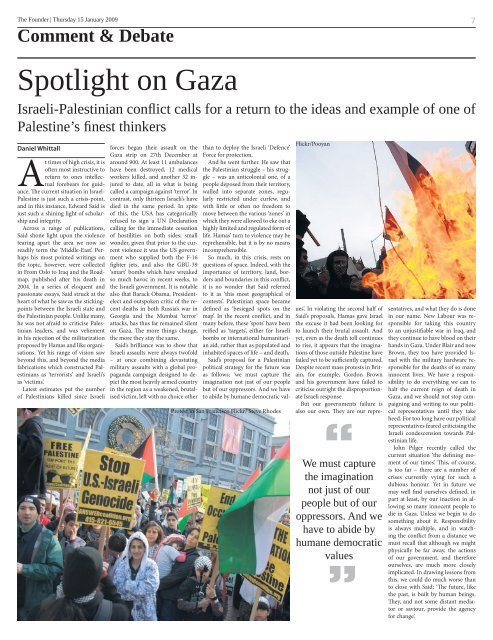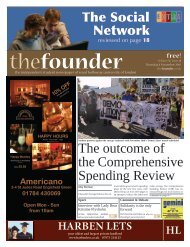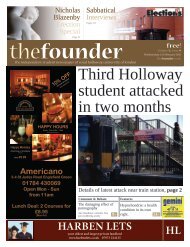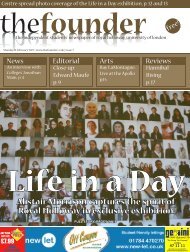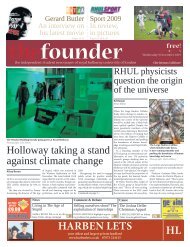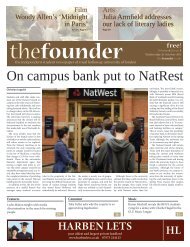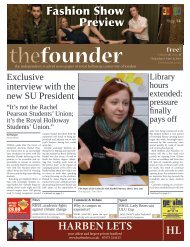Holloway mourns death of student - The Founder
Holloway mourns death of student - The Founder
Holloway mourns death of student - The Founder
You also want an ePaper? Increase the reach of your titles
YUMPU automatically turns print PDFs into web optimized ePapers that Google loves.
<strong>The</strong> <strong>Founder</strong> | Thursday 15 January 2009<br />
Comment & Debate<br />
7<br />
Spotlight on Gaza<br />
Israeli-Palestinian conflict calls for a return to the ideas and example <strong>of</strong> one <strong>of</strong><br />
Palestine’s finest thinkers<br />
Daniel Whittall<br />
At times <strong>of</strong> high crisis, it is<br />
<strong>of</strong>ten most instructive to<br />
return to ones intellectual<br />
forebears for guidance.<br />
<strong>The</strong> current situation in Israel-<br />
Palestine is just such a crisis-point,<br />
and in this instance, Edward Said is<br />
just such a shining light <strong>of</strong> scholarship<br />
and integrity.<br />
Across a range <strong>of</strong> publications,<br />
Said shone light upon the violence<br />
tearing apart the area we now so<br />
readily term the ‘Middle-East’. Perhaps<br />
his most pointed writings on<br />
the topic, however, were collected<br />
in From Oslo to Iraq and the Roadmap,<br />
published after his <strong>death</strong> in<br />
2004. In a series <strong>of</strong> eloquent and<br />
passionate essays, Said struck at the<br />
heart <strong>of</strong> what he saw as the stickingpoints<br />
between the Israeli state and<br />
the Palestinian people. Unlike many,<br />
he was not afraid to criticise Palestinian<br />
leaders, and was vehement<br />
in his rejection <strong>of</strong> the militarization<br />
proposed by Hamas and like organisations.<br />
Yet his range <strong>of</strong> vision saw<br />
beyond this, and beyond the media<br />
fabrications which constructed Palestinians<br />
as ‘terrorists’ and Israeli’s<br />
as ‘victims’.<br />
Latest estimates put the number<br />
<strong>of</strong> Palestinians killed since Israeli<br />
forces began their assault on the<br />
Gaza strip on 27th December at<br />
around 900. At least 11 ambulances<br />
have been destroyed, 12 medical<br />
workers killed, and another 32 injured<br />
to date, all in what is being<br />
called a campaign against ‘terror’. In<br />
contrast, only thirteen Israeli’s have<br />
died in the same period. In spite<br />
<strong>of</strong> this, the USA has categorically<br />
refused to sign a UN Declaration<br />
calling for the immediate cessation<br />
<strong>of</strong> hostilities on both sides; small<br />
wonder, given that prior to the current<br />
violence it was the US government<br />
who supplied both the F-16<br />
fighter jets, and also the GBU-39<br />
‘smart’ bombs which have wreaked<br />
so much havoc in recent weeks, to<br />
the Israeli government. It is notable<br />
also that Barack Obama, Presidentelect<br />
and outspoken critic <strong>of</strong> the recent<br />
<strong>death</strong>s in both Russia’s war in<br />
Georgia and the Mumbai ‘terror’<br />
attacks, has thus far remained silent<br />
on Gaza. <strong>The</strong> more things change,<br />
the more they stay the same.<br />
Said’s brilliance was to show that<br />
Israeli assaults were always tw<strong>of</strong>old<br />
– at once combining devastating<br />
military assaults with a global propaganda<br />
campaign designed to depict<br />
the most heavily armed country<br />
in the region as a weakened, brutalised<br />
victim, left with no choice other<br />
Protest in San Francisco Flickr/ Steve Rhodes<br />
Flickr/Pooyan<br />
“<br />
We must capture<br />
the imagination<br />
not just <strong>of</strong> our<br />
people but <strong>of</strong> our<br />
oppressors. And we<br />
have to abide by<br />
humane democratic<br />
values<br />
”<br />
than to deploy the Israeli ‘Defence’<br />
Force for protection.<br />
And he went further. He saw that<br />
the Palestinian struggle – his struggle<br />
– was an anticolonial one, <strong>of</strong> a<br />
people deposed from their territory,<br />
walled into separate zones, regularly<br />
restricted under curfew, and<br />
with little or <strong>of</strong>ten no freedom to<br />
move between the various ‘zones’ in<br />
which they were allowed to eke out a<br />
highly limited and regulated form <strong>of</strong><br />
life. Hamas’ turn to violence may be<br />
reprehensible, but it is by no means<br />
incomprehensible.<br />
So much, in this crisis, rests on<br />
questions <strong>of</strong> space. Indeed, with the<br />
importance <strong>of</strong> territory, land, borders<br />
and boundaries in this conflict,<br />
it is no wonder that Said referred<br />
to it as ‘this most geographical <strong>of</strong><br />
contests’. Palestinian space became<br />
defined as ‘besieged spots on the<br />
map’. In the recent conflict, and in<br />
many before, these ‘spots’ have been<br />
reified as ‘targets’, either for Israeli<br />
bombs or international humanitarian<br />
aid, rather than as populated and<br />
inhabited spaces <strong>of</strong> life – and <strong>death</strong>.<br />
Said’s proposal for a Palestinian<br />
political strategy for the future was<br />
as follows; ‘we must capture the<br />
imagination not just <strong>of</strong> our people<br />
but <strong>of</strong> our oppressors. And we have<br />
to abide by humane democratic values’.<br />
In violating the second half <strong>of</strong><br />
Said’s proposals, Hamas gave Israel<br />
the excuse it had been looking for<br />
to launch their brutal assault. And<br />
yet, even as the <strong>death</strong> toll continues<br />
to rise, it appears that the imaginations<br />
<strong>of</strong> those outside Palestine have<br />
failed yet to be sufficiently captured.<br />
Despite recent mass protests in Britain,<br />
for example, Gordon Brown<br />
and his government have failed to<br />
criticise outright the disproportionate<br />
Israeli response.<br />
But our governments failure is<br />
also our own. <strong>The</strong>y are our representatives,<br />
and what they do is done<br />
in our name. New Labour was responsible<br />
for taking this country<br />
to an unjustifiable war in Iraq, and<br />
they continue to have blood on their<br />
hands in Gaza. Under Blair and now<br />
Brown, they too have provided Israel<br />
with the military hardware responsible<br />
for the <strong>death</strong>s <strong>of</strong> so many<br />
innocent lives. We have a responsibility<br />
to do everything we can to<br />
halt the current reign <strong>of</strong> <strong>death</strong> in<br />
Gaza, and we should not stop campaigning<br />
and writing to our political<br />
representatives until they take<br />
heed. For too long have our political<br />
representatives feared criticising the<br />
Israeli condescension towards Palestinian<br />
life.<br />
John Pilger recently called the<br />
current situation ‘the defining moment<br />
<strong>of</strong> our times’. This, <strong>of</strong> course,<br />
is too far – there are a number <strong>of</strong><br />
crises currently vying for such a<br />
dubious honour. Yet in future we<br />
may well find ourselves defined, in<br />
part at least, by our inaction in allowing<br />
so many innocent people to<br />
die in Gaza. Unless we begin to do<br />
something about it. Responsibility<br />
is always multiple, and in watching<br />
the conflict from a distance we<br />
must recall that although we might<br />
physically be far away, the actions<br />
<strong>of</strong> our government, and therefore<br />
ourselves, are much more closely<br />
implicated. In drawing lessons from<br />
this, we could do much worse than<br />
to close with Said; ‘<strong>The</strong> future, like<br />
the past, is built by human beings.<br />
<strong>The</strong>y, and not some distant mediator<br />
or saviour, provide the agency<br />
for change’.


